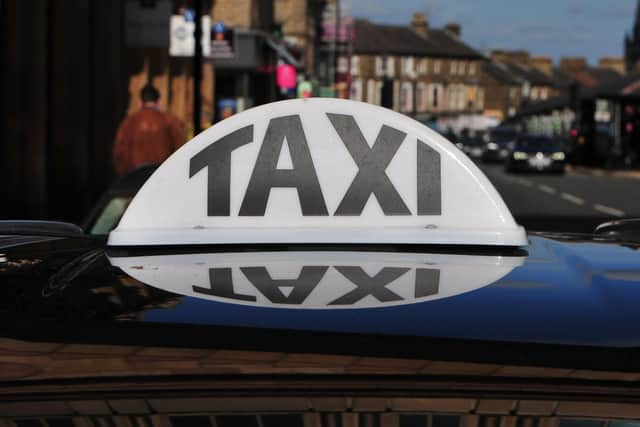Mansfield taxis buck national trend - but more drivers are needed


However, the taxi firms report a shortage of drivers to cope with the workload, and say they urgently need to recruit more.
Figures released by the Department for Transport reveal that, across England, the number of licensed vehicles decreased by 16 per cent in the year to March 2021.
Advertisement
Hide AdAdvertisement
Hide AdThousands of taxi-drivers are reported to have deserted the industry after receiving little or no support from the government during the pandemic.
But in Mansfield, the number of vehicles rose from 117 to 118, of which 77 were traditional taxis that can be hailed from the street and 44 were private-hire vehicles, which need to be pre-booked.
The statistics baffled bosses at ACE-ABC Taxis, based at Great Central Road in Mansfield, where they are having to turn work away because there aren’t enough drivers on the circuit. They claim the figures do not reflect reality.
“There are far fewer drivers on the road, and there are no new ones coming through,” said a spokesman for the company.
Advertisement
Hide AdAdvertisement
Hide Ad"Maybe a lot of people are leaving the trade and finding alternative employment.
"In many ways, it’s the perfect storm. After Brexit, a lot of drivers have returned to their home countries. And after the pandemic, a lot of drivers who were in their late 50s and towards the end of their careers are deciding they can manage if they retire.
"However, people are using taxis more often. We have more business now than before the pandemic. So if there are any drivers out there who fancy making a move, we are recruiting.”
ACE-ABC’s views are supported by separate data, which shows that, at 1.1, Mansfield has a much lower number of taxis per 1,000 people than the national average, which is 4.5 and has plummeted from 5.3 since 2020.
Advertisement
Hide AdAdvertisement
Hide AdThe National Private Hire and Taxi Association (NPHTA) believes many of its members have left the industry over the last year and switched to delivery-driving for companies such as Amazon and Deliveroo.
David Lawrie, director of the NPHTA, said: “Due to the absence of financial support for the taxi and private hire industry, many drivers have had to find alternative work or go on benefits to keep a roof over their heads and feed their families.
"They have felt abandoned, unappreciated, kicked into the long grass and forgotten about.”
He called on the government to offer more targeted financial support, and claimed the taxi trade was “clutching at straws” to keep going.
Advertisement
Hide AdAdvertisement
Hide AdGMB, the union for taxi drivers, said the pandemic has had “a huge effect” on driver numbers.
Mick Rix, GMB national officer, said: “It will take some time for local markets to get back to the levels of use by customers prior to Covid-19.
"Many drivers have given up and handed in their vehicles and licences.”
Analysis carried out in November 2020 showed that drivers were earning just 20 per cent of what they were at the same time in 2019.
Advertisement
Hide AdAdvertisement
Hide AdA spokeswoman for the government said: “The majority of taxi drivers are self-employed and, during the pandemic, they have been able to apply to the Self-Employment Income Support Scheme for grants. Taxi companies have also been eligible for grants from local councils.”
